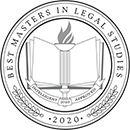
M.A. in Law – General Legal Studies
Advance Your Career with a Customizable Online Law Degree
The Master of Arts in Law – General Legal Studies gives you the freedom to customize a program that will expand your legal knowledge and increase your marketability. Through this general legal studies degree, you will be grounded in foundational legal contexts, taught through a Christian worldview, so you can better understand the laws that affect your career and solidify your reputation as a trusted professional. Designed for working professionals, this is an online law degree with select on-campus course options.
Enhance Your Credentials without a J.D.
Earn your M.A. in Law credential in just five semesters with this practical alternative to the on-campus 3-year Juris Doctor degree.
Advance Your Knowledge
Choose from a robust list of M.A. in Law courses to equip you with essential legal theory, policy, and best practices.
Sharpen Your Skill Set
Complement your degree with courses that prepare you to effectively operate within a legal environment and work with attorneys.
Gain a Competitive Edge
Acquire the knowledge required for professional advancement and improved marketability with this online law degree.

|
On completing the online M.A. in Law – General Legal Studies degree, you will be able to:
- Demonstrate an understanding of legal issues pertaining to contract law, property law and policy, and criminal law.
- Research American law, including cases, and statutes.
- Analyze the Constitution and the power and limitations of the three rungs of government.
- Provide an astute legal perspective to those you lead and serve.
Career Opportunities
- Nonprofit advocacy
- C-level leadership
- National security
- Human resources
- Entrepreneurship
- Advanced Paralegal Studies
- Alternative Dispute Resolution
- Business
- Criminal Justice
- Cybersecurity Law
- General Legal Studies
- Healthcare Law
- Human Resources Law
- Human Rights & Rule of Law
- Immigration Law
- International Business Transactions
- National Security
- Nonprofit Organization Law
- Regulatory Compliance
Admission Requirements – M.A. in Law
2020-2021 Semester Check-In Deadlines:
All new students are expected to check-in for the semester 2 weeks prior to the session start date. Students should apply, be accepted, enroll in their first courses, and confirm a plan to pay for their courses prior to this date.
| Session | Semester Check-In | Session Start Date |
| Session A | Friday, August 14 | Monday, August 24 |
| Session M | Friday, September 11 | Monday, September 21 |
| Session B | Friday, October 16 | Monday, October 26 |
| Session C | Tuesday, January 5 | Monday, January 11 |
| Session T | Friday, January 29 | Monday, February 8 |
| Session D | Friday, March 5 | Monday, March 15 |
| Session E | Friday, April 30 | Monday, May 10 |
| Session F | Friday, June 11 | Monday, June 21 |
Note: On-campus international applicants must meet a fall semester application deadline of February 15 with an academic acceptance deadline of March 15 or a spring semester application deadline of June 15 with an academic acceptance deadline of July 15.
Regent Law admits students with academic promise and calling who are serious about the critical roles they will assume upon graduation. If you have decided to earn your master’s degree in law, we make applying to graduate school easy.
Admissions Criteria
The admissions committee seeks applicants who will bring a range of backgrounds, experiences, and perspectives to Regent University’s School of Law. The M.A. in Law program seeks highly motivated students and professionals who appreciate the educational benefits and professional development opportunities a graduate legal-based education offers. Each of the following will be evaluated to assess an applicant’s potential for success in the program.
- Academic achievement (GPA, course rigor, and institution(s) attended)
- Mission Fit
- Responses to the questions in the application for admission
- Skills relevant to the practice of law
Admissions Requirements
Applicants should possess a bachelor’s degree from an approved college or university prior to beginning their legal studies. The admissions committee does not recommend any single major or undergraduate field of study, but welcomes majors ranging from political science to engineering, and from biblical studies to psychology. LSAT and GRE not required for admission to our program.
Admissions Decisions
Admission decisions are made on a rolling basis, with most applicants being notified within two weeks of the date that the application and all supporting documents are received by the Admissions Office.
How to Apply to Graduate School – M.A. in Law Application Process
1. Complete Your Online Application
Note: If you are unable to complete our application due to a disability, please contact our Admissions Office for assistance.
2. Pay Your $50 Application Fee
Pay the $50 nonrefundable application fee by check or money order mailed to Regent University, Enrollment Support Services, 1000 Regent University Drive, Virginia Beach, VA 23464.
3. Submit your Unofficial College Transcripts*
Unofficial transcripts from a U.S.-based school, indicating successful completion of a bachelor’s degree program, can be used for an admissions decision. Email your unofficial transcript to apply@regent.edu using the subject line: LAW Master’s Application Pieces.
Non-U.S. transcripts must be evaluated by an NACES-approved company. See the International Admissions Checklist for details.
*Upon conditional acceptance to the program by review of unofficial transcripts, Regent University’s Admissions Office will attempt to obtain your official transcripts from your U.S. degree-granting institution, which indicate successful completion of a bachelor’s degree program. We will notify you if your previous institution will not release transcripts directly to us.
4. Submit Your Professional Resume (Optional)
Your professional resume or curriculum vitae should include:
- Employment history with details of responsibilities, skill sets, and results
- School, community, and church leadership positions
- Service activities in which you have been involved
- Academic and non-academic honors and distinctions you have received
Email your resume to apply@regent.edu using the subject line: LAW Master’s Application Pieces.
5. Complete an Admissions Questionnaire Regarding Your Professional Goals and Interests
6. Government-Issued ID
To ensure academic integrity, Regent University requires a copy of a government-issued ID. Please email a scanned copy or photograph of it to apply@regent.edu with the subject line: Government ID.
7. International Applicants
Visit the International Students Admissions page for additional admission requirements and to determine if you qualify as an international student.
Note: All items submitted as part of the application process become the property of Regent University and cannot be returned.
2019-20 Tuition Rates
| Degree Level / Program | Cost Per Credit Hour |
|---|---|
M.A. in Law | $675 per credit hour*
|
View estimated Cost of Attendance.
Student Fees | Cost Per Semester |
University Services Fee (Online Students) | $550 (per semester) |
2020-21 Tuition Rates
| Degree Level / Program | Cost Per Credit Hour |
|---|---|
M.A. in Law | $675 per credit hour*
|
View estimated Cost of Attendance.
Student Fees | Cost Per Semester |
University Services Fee (Online Students) | $600 (per semester) |
*Rates are subject to change at any time.
Learning Outcomes
Upon completing the M.A. in Law program, each student will be able to:
- Demonstrate an appropriate level of legal knowledge within the student’s concentration;
- Apply legal knowledge in practical settings;
- Write knowledgeably and effectively on legal issues;
- Explain the relevance of Christian principles to law.

